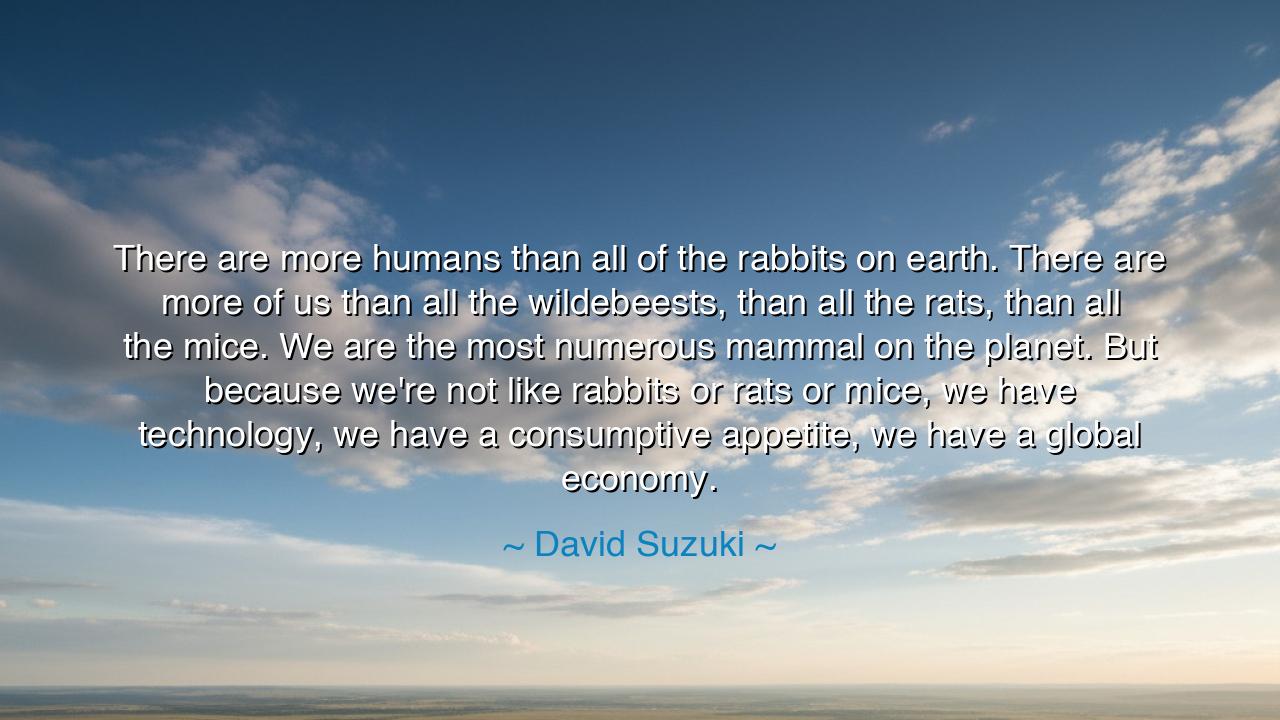
There are more humans than all of the rabbits on earth. There
There are more humans than all of the rabbits on earth. There are more of us than all the wildebeests, than all the rats, than all the mice. We are the most numerous mammal on the planet. But because we're not like rabbits or rats or mice, we have technology, we have a consumptive appetite, we have a global economy.






David Suzuki, guardian of the earth and voice for the voiceless, once proclaimed: “There are more humans than all of the rabbits on earth. There are more of us than all the wildebeests, than all the rats, than all the mice. We are the most numerous mammal on the planet. But because we’re not like rabbits or rats or mice, we have technology, we have a consumptive appetite, we have a global economy.” In these words lies both awe and warning. He reminds us of our power as a species — countless in number, unchallenged in dominance — yet warns that our uniqueness carries a peril unlike any other: for unlike other creatures, our technology and our appetite make us a force that can unmake the very world we depend upon.
The first truth Suzuki reveals is the sheer abundance of humanity. Once, our ancestors were few, scattered across the wilderness, vulnerable to famine, disease, and predators. Today, we are beyond countless, stretching across every continent, filling cities, towns, and fields. We outnumber even the most prolific of creatures — the rabbits that multiply swiftly, the mice that scurry unseen, the rats that thrive in the shadows. In our numbers, we are unmatched. But unlike these other mammals, our growth is not limited by nature alone, for we have bent nature itself to our will.
Yet herein lies the heart of Suzuki’s message: that because we are not bound like the rabbit or the rat, our impact is far greater. Rabbits consume grass, rats scavenge grain, wildebeests graze upon the plains — but humans wield technology, and with it, we consume not only what is near but what is far. We tear minerals from mountains, we burn forests into smoke, we draw fish from the deepest seas. And still we hunger. The global economy fuels this hunger, linking every hand and every mouth in a chain of consumption that reaches into every corner of the earth.
History offers a lesson in this truth. Consider the story of Easter Island, once covered in great forests. The people, skilled and ambitious, cut down trees to build canoes and erect monuments. But in their zeal, they consumed beyond what the land could give. The forests vanished, the soil eroded, and the people fell into collapse. Their tragedy is a mirror held before us: what was true of one island can be true of the whole earth. With our technology and our appetite, we risk consuming not just our forests, but the very foundation of life itself.
But Suzuki’s words are not only of despair; they are also a call to responsibility. To recognize our numbers, our power, and our economy is to recognize also our ability to change. For if we can burn forests, we can also plant them. If we can poison rivers, we can also cleanse them. If our technology can destroy, it can also heal. The difference lies not in the tools themselves but in the wisdom with which they are used. Just as fire can both warm and destroy, so too can our inventions either uplift or doom us.
The lesson for the listener is clear: to be human is to be more than numerous; it is to be responsible. Other creatures live within the limits set for them, but we, because of our technology and our global reach, must set our own limits. This requires humility, restraint, and a recognition that the earth is not infinite. To live without this wisdom is to invite collapse; to live with it is to secure a future where our children may thrive.
Therefore, let the listener act with reverence. Examine your appetite, for every act of consumption echoes across the earth. Use technology not as a weapon of greed but as a tool of stewardship. Seek balance in the global economy, where prosperity does not come at the cost of the earth itself. And remember Suzuki’s warning: we are the most numerous mammal, but unlike the others, our power is vast. Let us wield it not with arrogance, but with care, lest our abundance become our undoing.






AAdministratorAdministrator
Welcome, honored guests. Please leave a comment, we will respond soon